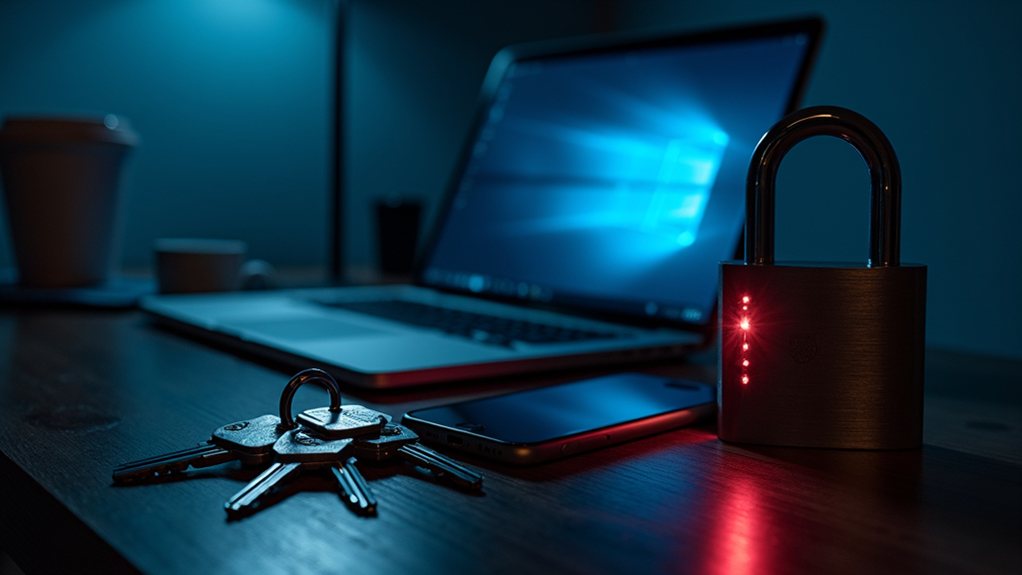Urgent: Why Your Gmail Password Could Be Your Weakest Link Today

Gmail passwords have become a dangerous vulnerability, with 94% of users recycling credentials across accounts as AI-powered attacks grow more sophisticated. Recent data reveals 2.5 billion users’ contact details were exposed, making Gmail accounts prime targets for phishing and social engineering schemes. With only 3% of passwords meeting NIST requirements and 81% of breaches stemming from weak credentials, Gmail security demands immediate attention. Understanding today’s evolving threats could prevent catastrophic account compromises.

Nearly every Gmail user faces an increasingly sophisticated barrage of threats to their account security, as evidenced by a recent cyberattack that exposed 2.5 billion users‘ contact details through a compromised Google-Salesforce database. While Google confirmed that no passwords were directly stolen, the breach has sparked a surge in highly targeted phishing campaigns and social engineering attacks that make previous scam attempts look like child’s play.
The real danger lies not in the breach itself, but in how most users manage their digital keys. A staggering 94% of people reuse passwords across multiple accounts – imagine using the same key for your house, car, office, and safety deposit box. It’s a hacker’s dream scenario, especially considering that 42% of these passwords are barely longer than a tweet handle, ranging from just 8 to 10 characters.
Reusing passwords across accounts is like handing cybercriminals a master key to your entire digital life.
The numbers paint a sobering picture: only 3% of passwords meet NIST’s complexity requirements, while 27% consist of basic lowercase letters and numbers – about as secure as leaving your front door key under the welcome mat. This widespread password negligence has contributed to a massive underground database of 16 billion stolen password records, with corporate favourites like “admin” and “password” appearing millions of times. Most concerning is that brute force attacks now account for 37% of all breaches, showing a significant increase from previous years. Using a password manager setup can significantly reduce these security risks while making it easier to maintain unique, complex passwords for all your accounts. Professional virus removal services can help eliminate any existing malware that may be logging your keystrokes.
The threat environment has evolved dramatically with artificial intelligence entering the cyber-criminal’s toolkit. Almost half of today’s phishing attempts leverage AI to craft deceptively authentic communications that could fool even the most vigilant users. These AI-powered attacks, combined with deepfake technology, create a perfect storm for account compromises, especially when targeting Gmail’s vast ecosystem of connected services.
What makes this particularly concerning is the documented behaviour of users and IT professionals alike. Only 15% of users employ password managers, while over half of IT professionals admit to sharing passwords through unsecured channels. The recent attack was initiated when scammers successfully executed social engineering tactics in June 2025.
When you consider that Gmail accounts often serve as the master key to Google Drive, Google Pay, and saved passwords across various services, the potential damage from a compromise becomes exponentially more severe.
The 2025 Salesforce-linked attack demonstrated how social engineering tactics have evolved beyond simple email scams. Attackers now execute sophisticated multi-channel campaigns, simultaneously targeting users through spoofed calls, fraudulent texts, and phishing emails – all designed to capture those precious login credentials.
In corporate environments, where 81% of hacking breaches stem from weak or reused passwords, the stakes are even higher. As AI continues to improve the sophistication of these attacks, the password practices of yesterday have become today’s critical vulnerability.
Final Thoughts
In today’s landscape of escalating cyber threats, password security is a critical concern for Gmail users. While Google is continually improving its protective measures, it is essential for users to take proactive steps such as creating strong passwords, enabling two-factor authentication, and conducting regular security audits. As hackers become more sophisticated, maintaining good password hygiene is crucial for safeguarding personal and professional data.
At Zoo Computer Repairs, we understand the importance of robust password security. Our team can assist you in implementing best practices, ensuring your Gmail account and sensitive information are well-protected. Don’t leave your online security to chance—click on our contact us page to get in touch and secure your peace of mind today!
